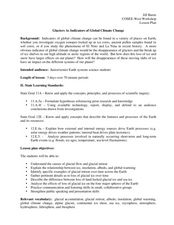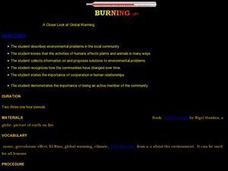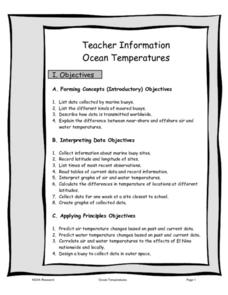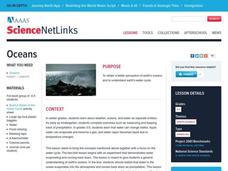Curated OER
The Disappearing Kelp Forest
Learners observe the effect "El Nino" left on kelp plants and sea urchins. They analyze the data collected by researchers, by graphing it on a TI calculator. Before graphing and analyzing the data, you may want to revisit the events of...
Curated OER
Extreme Weather!
Middle schoolers create a web page explaining a specfic type of extreme weather and identify recent examples of the weather occurance. They form small groups to research the weather type and build an HTML word document to share with...
Curated OER
Oceans and Weather
Students analyze the impact the ocean and its currents have on weather. In this oceans and weather lesson, students analyze data comparing inland and coastal weather, and analyze satellite data for evidence of El Nino.
Curated OER
Glaciers As Indicators of Global Climate Change
Students research about glacial ice melting on the four major spheres of the Earth. In this earth science lesson, students explain how this process relates to global warming. They create a presentation and share their findings with the...
Curated OER
The Potential Consequences of Climate Variability and Change
Students analyze the impact of climate variability and change utilizing a broad span of topics over a wide range of grade levels. This three lesson unit is easily adapted for the various instructional levels listed.
Curated OER
Potential Consequences of Climate Variability and Change
Students examine the potential impact of climate change to agriculture, coastal areas, forests, water, and human health. They hypothesize what might happen to a sugar maple forest and hold a debate about global warming.
Curated OER
Burning Up! A Look at Global Warming
Students investigate global warming. In this global warming lesson, students watch movies about global warming, discuss problems in their local community and see how communities have changed over time. Students realize the importance of...
Curated OER
Ocean Temperatures
Students list data collected by marine buoys and the different kinds of moored buoys. They describe how data is transmitted worldwide. They explain the difference between near shore and offshore air and water temperatures.
Curated OER
Oceans
Middle schoolers use their prior knowledge to being their examination of the water cycle. In groups, they complete an experiment in which they can see water evaporating and coming back to the ground. They discover the ocean's water...
Curated OER
High and Low: Pressures and Fronts
Students investigate basic information about high- and low-pressure fronts and how they affect the weather. They observe weather patterns and cloud formations. Students study the basic pattern of movement of high- and low-pressure...
Curated OER
FLY HIGH!!!
Students create their own bird study in their own schoolyard using the scientific method (see Testing a Hypothesis in Join the Project). Students do research in the library, at a local college, or on the Internet to determine the...
Curated OER
the Potential Consequences of Climate Variability And Change
Students analyze the consequences of changing variables on a system. Changes in a model are measured and recorded and conclusions drawn based on the data provided in this six lessons unit.
NASA
El Nino: Making Sense of the Weather: Global Wind Patterns
This is an educational site offered by NASA that has information on global winds, including prevailing westerlies, with illustrations. Included is a short activity to illustrate the winds.














